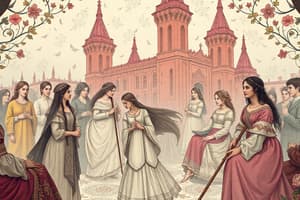Podcast
Questions and Answers
How do beliefs influence an individual's actions and values?
How do beliefs influence an individual's actions and values?
Beliefs shape an individual's understanding of what is true, which in turn influences their actions and values, often guiding decisions and behavior in various situations.
In what ways can traditions contribute to a group's identity?
In what ways can traditions contribute to a group's identity?
Traditions provide a sense of continuity and belonging, helping to define a group's identity through shared customs and rituals passed down through generations.
What role do cultural experiences play in shaping beliefs?
What role do cultural experiences play in shaping beliefs?
Cultural experiences significantly influence beliefs by exposing individuals to different values and practices, which shape their convictions and understanding of reality.
Why is it important to understand the variations in beliefs between different groups?
Why is it important to understand the variations in beliefs between different groups?
How can traditions adapt to changing circumstances while retaining their core values?
How can traditions adapt to changing circumstances while retaining their core values?
How do values influence individual decision-making within a society?
How do values influence individual decision-making within a society?
In what ways do cultural beliefs impact social norms and behaviors?
In what ways do cultural beliefs impact social norms and behaviors?
What role do traditions play in maintaining cultural identity?
What role do traditions play in maintaining cultural identity?
How do values evolve over time within a society?
How do values evolve over time within a society?
How can conflicting values lead to misunderstandings in multicultural societies?
How can conflicting values lead to misunderstandings in multicultural societies?
What factors contribute to the formation of societal values?
What factors contribute to the formation of societal values?
What is the relationship between values and political behavior in a society?
What is the relationship between values and political behavior in a society?
How do religious values differ from cultural values in shaping behaviors?
How do religious values differ from cultural values in shaping behaviors?
Flashcards
Beliefs
Beliefs
Convictions or understandings that people hold to be true or real.
How are beliefs shaped?
How are beliefs shaped?
Beliefs that are often influenced by a person's cultural, religious, or personal experiences.
Traditions
Traditions
Practices and beliefs passed down through generations within a group or community.
Why are traditions important?
Why are traditions important?
Signup and view all the flashcards
Are traditions static?
Are traditions static?
Signup and view all the flashcards
What is culture?
What is culture?
Signup and view all the flashcards
What is society?
What is society?
Signup and view all the flashcards
What is politics?
What is politics?
Signup and view all the flashcards
What are values?
What are values?
Signup and view all the flashcards
What are key elements of culture?
What are key elements of culture?
Signup and view all the flashcards
What are key structures in society?
What are key structures in society?
Signup and view all the flashcards
What are key aspects of politics?
What are key aspects of politics?
Signup and view all the flashcards
How do values affect individuals?
How do values affect individuals?
Signup and view all the flashcards
Study Notes
Culture
- Culture encompasses the shared beliefs, values, customs, behaviours, and artifacts that characterize a group or society.
- It's learned, not innate, and transmitted through generations.
- Culture shapes individual perceptions, attitudes, and behaviours.
- Key elements of culture include language, religion, art, music, food, and social norms.
- Cultural diversity exists across societies and is constantly evolving.
- Cultural variations can lead to misunderstandings and conflicts if not acknowledged and respected.
- Examples of cultural elements include dress codes, social etiquette, family structures, and communication styles.
Society
- A society is a group of people who live in a defined geographical area, interact with each other, and share a common culture.
- Societies have established social structures, institutions, and organizations.
- Key structures in society include family, education, government, and economy.
- Social interactions and relationships determine social dynamics and processes within societies.
- Social groups are categorized by various factors, including age, gender, ethnicity, and socioeconomic status.
- Social structures influence individual behaviour and societal development.
- Societal change occurs over time due to various factors like technological progress or shifts in values.
Politics
- Politics involves the activities associated with the governance of a country or area, especially the debate or conflict among individuals or groups about leadership or policies.
- Political systems differ across societies and include democracies, monarchies, and authoritarian regimes.
- Key aspects of politics include power, authority, influence, and decision-making within a society.
- Political ideologies shape political behaviour and the policies of the government.
- Politics involves the allocation of scarce resources, the resolution of conflicts, and the setting of public policy.
- Political participation includes voting, protesting, lobbying, and engaging in political discourse.
Values
- Values are deeply held principles or standards by which individuals or a society judge what is good or bad, desirable or undesirable.
- Values are abstract ideas and can be grouped into categories like religious, personal, or cultural values.
- Values affect individual choices, decisions, and behaviours.
- Individuals often prioritize certain values over others.
- Societal values evolve over time as societies adapt to new challenges and experiences.
Beliefs
- Beliefs are convictions or understandings that people hold to be true or real.
- Beliefs are often shaped by cultural, religious, or individual experiences.
- Beliefs can influence actions, values, and behaviour in various situations.
- Beliefs can vary significantly between individuals and groups, highlighting the importance of cultural understanding.
- Beliefs often support particular values or concepts that individuals and groups consider vital.
Traditions
- Traditions are the beliefs and practices of a particular group or community that have been passed down through generations.
- Traditions can encompass customs, rituals, ceremonies, and specific behaviours.
- Traditions play a role in defining and maintaining the sense of identity and continuity in groups or communities.
- Examples of traditions include holidays, celebrations, social rituals and art forms.
- Traditions can change with time, adapting to changing circumstances and outside influences.
Studying That Suits You
Use AI to generate personalized quizzes and flashcards to suit your learning preferences.




